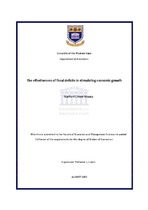| dc.contributor.advisor | Loots, L.J | |
| dc.contributor.author | Mujuta, Stanford Cheelo S. | |
| dc.date.accessioned | 2015-04-24T12:06:17Z | |
| dc.date.available | 2015-04-24T12:06:17Z | |
| dc.date.issued | 2013 | |
| dc.identifier.uri | http://hdl.handle.net/11394/4080 | |
| dc.description | Magister Economicae - MEcon | en_US |
| dc.description.abstract | This thesis applies a Structural Vector Auto Regression model to find the response of economic
growth to fiscal deficits in South Africa. The results of this study help to assess the effectiveness of
discretionary fiscal policy in stimulating economic growth in this economy. Our study finds a
negligible response of economic growth to fiscal deficits, for both the short-run and long-run,
implying that discretionary fiscal policy is not an effective economic stimulatory policy in South
Africa. Based on the analyses of the impulse response functions and the forecast error variance
decompositions, we believe this finding could have been caused by: weak automatic stabilisers; the
leakage of fiscal deficits through increased imports and the appreciation of the real effective
exchange rate - both of which lead to a trade deficit; the crowding-out of private investment; and
finally, the South African Reserve Bank’s (SARB) compliance with the inflation-targeting monetary
policy which could have offset the fiscal stimulus. These causes have both theoretical and empirical
support for the impotence of fiscal deficits on economic growth. The findings are efficient and
reliable, as our model passed all the most important diagnostic tests. | en_US |
| dc.language.iso | en | en_US |
| dc.publisher | University of the Western Cape | en_US |
| dc.title | The effectiveness of fiscal deficits in stimulating economic growth | en_US |
| dc.rights.holder | University of the Western Cape | en_US |

